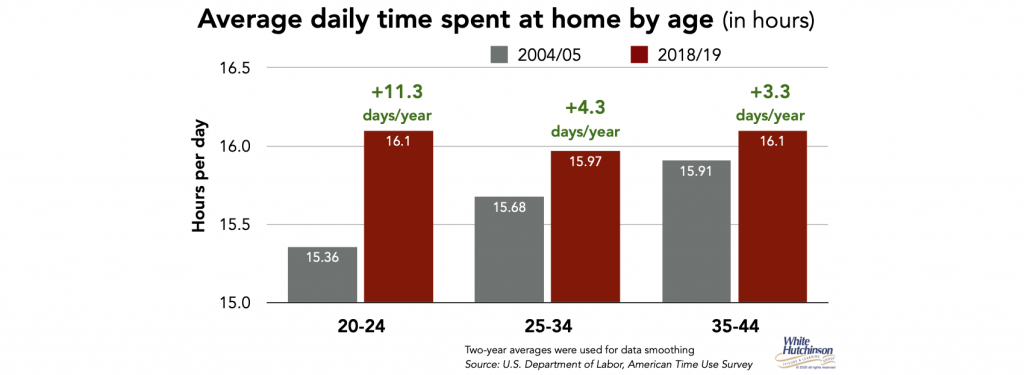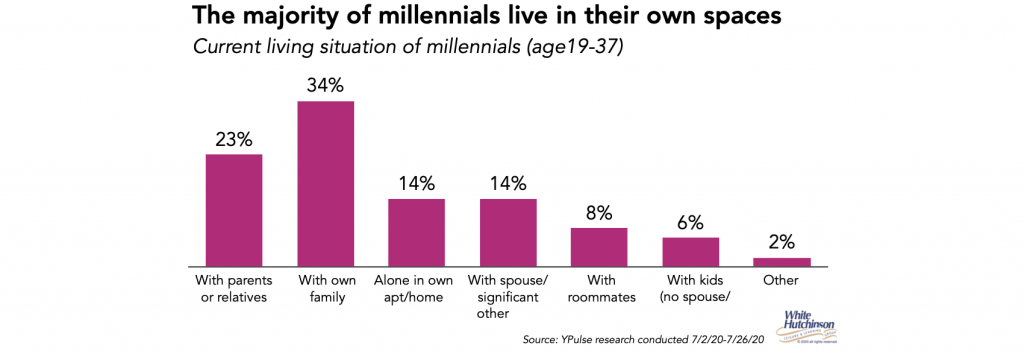In one of my blogs last week, I discussed how the coronavirus crisis has accelerated the decades-long trend of people increasingly spending more time at home, and how much of that increased time at home is likely to continue once the crisis has passed. Four recently released studies further add evidence to that possible post-pandemic scenario.
YPulse specializes in studies of Gen Z and millennials. They’ve been studying Covid’s long-term impacts on young adults’ feelings about their homes.
Even before the coronavirus crisis hit, YPulse found that 75% of millennials considered themselves homebodies. To check that out, I examined whether young adults have been spending more time at home. The data clearly shows an increase for three different age cohorts between the ages of 20 and 44, not an exact match for millennials, but close.

Since 2004/05 (2-year averaging), young adults have spent the equivalent of between 3.3 and 11.3 more days at home. To put it another way, young adults are spending between 79 and 270 fewer hours away-from-home each year doing different activities.
YPulse found that although some millennials have had to move back to live with their parents during the pandemic, primarily due to unemployment, the majority of millennials (77%) still live in their own homes.

The coronavirus is increasing the meaning of home to them. YPulse found that nearly 8 in 10 young adults (78%) are now trying to make their home a nicer place to spend time. They describe their ideal home as comfortable, cozy, safe, calming, and quiet. The meaning of home has shifted to be a relaxing atmosphere and soothing space. YPulse says as a result, there is a new nesting trend underway.
Whether they own or rent, YPulse found the stay-at-home generations are investing in their homes to evolve them to fit their needs. Nearly two-thirds (64%) say they’ve become more interested in improving/fixing up their homes because of Covid-19. During the quarantine, almost two-thirds (64%) of young people have purchased items to make their home more comfortable. There is also an increased interest in DIY home projects.

An August Bankrate poll found that 59% of homeowners have already completed at least $500 of work of home upgrades during the pandemic or plan to before the end of the year. For millennials, three-quarters (75%) have already completed the upgrades or plan to.
In their Q2 2020 survey, GlobalWebIndex found that consumers are shifting their spending to in-house and home improvement purchases.
Research of U.S. adults by the Leaf Group has identified key behavior shifts since the height of the stay-at-home orders in April. Their study revealed permanent changes to adults’ behaviors, including prioritizing a more home-centric lifestyle. The study found that nearly 7 in ten adults (69%) say organizing and improving their home has become a part of their routine. When they can leave home and visit restaurants and businesses, nearly 9 in 10 say they will continue to cook at home (89%), and 4 in 10 say they will continue to have virtual meetups with friends and family (40%).

People also say that they will permanently increase cooking at home (35%), taking on home décor projects (47%), doing DIY projects (42%), and undertaking home renovation projects (38%).
The implications of the increased investment people are making in their homes to make them inviting and comfortable places, plus all the new at-home digital/virtual socialization, entertainment, and home delivery options people now have, means that location-based entertainment and cultural venues will be facing new headwinds since many of these new at-home behaviors will continue even when the risk of going out to public places has ended. Entertainment and cultural venues will need to adjust their thinking of who they’re competition is. Rather than other entertainment and cultural venues, their number one competition will probably be the stay-at-home generations’ nests, their homes.
Follow me on Twitter and Linkedin – I try to post news and information that is relevant to the location-based leisure, LBE and FEC industries a few times every weekday.
To subscribe to my blog, click here




